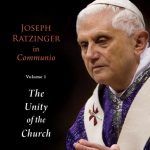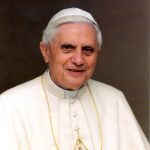Pope Benedict XVI. Joseph Ratzinger in Communio, Volume 1: The Unity of the Church. Eerdmans Publishing Co., 2010.
Pope Benedict XVI, born Joseph Alois Ratzinger, is the 265th and reigning pope of the Roman Catholic Church. After being ordained in 1951 and earning his doctoral degree in 1953, he spent many years in academia. During that time, together with Hans Urs von Balthasar, Henri de Lubac and other important theologians, he initiated the theological journal “Communio“. After leaving academia and serving as an archbishop he served as Prefect of the Congregation for the Doctrine of the Faith from 1981 to 2005. In April 2005 he was elected pope. Visit the Vatican’s website to view a more complete biography or other information about Pope Benedict XVI.
Book Basics
This is the first of three volumes by Pope Benedict XVI to be printed in the Ressourcement: Retrieval and Renewal in Catholic Thought series, which is edited by David L. Schindler. The book contains fourteen essays written by the Pope on issues related to the unity of the church, which appeared in the North American edition of the “Communio” journal from 1974 to 2005.
I found Interreligious Dialogue and Jewish-Christian Relations to be the most  thought provoking essay in the collection. The occasion for the text was a forum in Paris for which he spoke of the Christian view and Rabbi Sztenjnberg offered a Jewish perspective. In the pope’s essay, he offers a background of how the church moved from ecumenicism to interreligious dialogue. As Christianity moves forward with interreligious dialogue it has multiple options, but none of these can or should seek to bring about the unification of religions. The pope summarizes his view on the issue with three points (p.155-156):
thought provoking essay in the collection. The occasion for the text was a forum in Paris for which he spoke of the Christian view and Rabbi Sztenjnberg offered a Jewish perspective. In the pope’s essay, he offers a background of how the church moved from ecumenicism to interreligious dialogue. As Christianity moves forward with interreligious dialogue it has multiple options, but none of these can or should seek to bring about the unification of religions. The pope summarizes his view on the issue with three points (p.155-156):
- The religions can encounter one another by delving more deeply into the truth, not by giving it up. Skepticism does not unite. Nor does sheepish pragmatism . . . What is required, however, is reverence for the other’s belief, along with the willingness to seek truth in what I find alien . . . I must also be willing to let my narrow understanding of truth be broken open, to learn my own beliefs better by understanding the other . . .
- Although we must always seek the positive in the other, union means that the other must help me to find the truth; we cannot and must not dispense with criticism.
- Does this mean that missionary activity must cease and be replaced by dialogue, in which we do not speak of truth, but help one another be better Christians, Jews, Moslems, Hindus, and Buddhists? My answer is no . . . The answer, I think, is that mission and dialogue must no longer be antitheses, but must penetrate each other. Dialogue is not random conversation, but aims at persuasion, at discovering the truth. Otherwise it is worthless.
So What
In the postmodern pluralistic religious world, interreligious dialogue is a given. Individual members of various faith groups regularly engage in the discipline and leaders of various traditions participate in formalized sessions.
- How much do you know about other religions? What do you plan to do to broaden that knowledge this year?
- How comfortable are you in engaging in genuine dialogue about matters of faith with someone of another faith tradition?
- How do you find the pope’s three guidelines to be helpful for interreligious dialogue? Are there any you disagree with? If so, explain your concerns.
